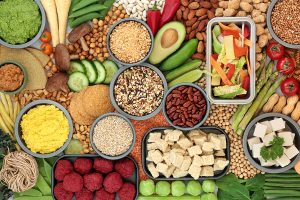Why Plant-Based Eating Is Gaining Popularity
In recent years, plant-based diets have gained traction not only due to health benefits but also in response to rising meat prices, supply uncertainties, and growing concerns about sustainability. As consumers look for more affordable, nutritious, and environmentally conscious food choices, transitioning to a diet that emphasizes plants is more relevant than ever.
A plant-based eating pattern doesn’t necessarily mean cutting out all animal products. Instead, it focuses on eating more foods that come from plants—like vegetables, fruits, whole grains, legumes, nuts, and seeds. According to Dr. Amita Jain, an Internal Medicine Physician at Bayhealth, “These foods provide all the nutrients we need, including protein, and are often easier to digest than animal-based products.”

What Is a Plant-Based Diet?
A plant-based diet is one that prioritizes whole, minimally processed foods that are derived from plants. It may or may not exclude meat entirely. There are various levels to plant-based eating:
-
Flexitarian: Mostly plant-based, occasionally includes meat or animal products.
-
Vegetarian: Excludes meat, poultry, and seafood.
-
Vegan: Avoids all animal products, including dairy, eggs, and honey.
Dr. Jain emphasizes that even partial adoption of plant-based habits can yield measurable health improvements.
Health Benefits of Eating More Plant-Based Foods
1. Improved Heart Health
A landmark 2019 study published in the Journal of the American Heart Association found that middle-aged adults who consumed diets rich in plant-based foods and low in animal-based foods had a significantly lower risk of dying from cardiovascular disease or heart attack. The abundance of fiber, antioxidants, and phytonutrients in plant foods supports healthier blood vessels and reduces inflammation.
2. Lower Body Mass Index (BMI)
A plant-forward lifestyle is often linked to reduced BMI, partly because these foods are generally lower in calories but higher in satiety-promoting fiber. This helps prevent overeating and supports long-term weight management.
3. Better Digestive Health
High-fiber foods like beans, lentils, whole grains, and leafy greens improve digestion, prevent constipation, and nourish the gut microbiome—leading to stronger immunity and better absorption of nutrients.
4. Reduced Risk of Chronic Diseases
A plant-based diet can reduce the risk of:
-
Type 2 Diabetes
-
Obesity
-
High blood pressure
-
Stroke
-
Certain cancers
These benefits are attributed to the anti-inflammatory and antioxidant properties of plant foods, along with the absence of saturated fats commonly found in red and processed meats.
Debunking the Protein Myth
One of the most persistent myths about plant-based eating is the belief that it lacks sufficient protein. According to Dr. Jain, “It’s a myth that we need meat to get enough protein. Ideally, 10–30% of our diet should come from protein, and there are many plant-based protein sources that are both nutrient-dense and easier to digest.”
Excellent Plant-Based Protein Sources:
-
Lentils
-
Chickpeas
-
Soybeans (edamame, tofu, tempeh)
-
Green peas
-
Broccoli
-
Quinoa
-
Chia seeds
Caution with “Meatless” Products
The market for meat alternatives has exploded in recent years, with many products designed to mimic the taste and texture of real meat. However, not all meatless options are created equal.
Dr. Jain cautions: “While they can be helpful for people transitioning off meat, many of these products are ultra-processed and contain high levels of sodium, artificial preservatives, and saturated fats.”
Healthier Alternatives:
-
Homemade bean burgers
-
Grilled tofu or tempeh
-
Jackfruit-based pulled “pork”
-
Whole legumes and grains
Always check the nutrition label and prioritize whole food ingredients whenever possible.
Healthy Plant-Based Snacking Ideas
Snacking is an area where plant-based eating really shines. Many plant foods are rich in fiber, healthy fats, and complex carbohydrates, helping to stabilize blood sugar levels and reduce cravings.
Smart Snack Options:
-
Fresh vegetables with hummus
-
A handful of pumpkin, chia, or flax seeds
-
Trail mix with unsalted nuts and dried fruit
-
Avocado toast on whole grain bread
-
Smoothies with almond milk, spinach, banana, and protein powder
Food Is Medicine: Choose Wisely
Dr. Jain aptly puts it: “In many ways, food is medicine. Making healthier choices today can prevent chronic illnesses tomorrow.” With plant-based foods, you’re not just eating to satisfy hunger—you’re nourishing your body for optimal function and longevity.
Incorporating more plant-based meals doesn’t require an all-or-nothing approach. Start small—replace one or two meals per week with plant-based options, explore new recipes, and gradually discover what works best for your body and lifestyle.
Frequently Asked Questions :
What does a plant-based diet include?
A plant-based diet includes fruits, vegetables, legumes, grains, nuts, and seeds. It focuses on whole, minimally processed plant foods and may or may not include animal products.
Is a plant-based diet healthy?
Yes. Plant-based diets are rich in nutrients, fiber, and antioxidants that support heart health, weight management, and reduce the risk of chronic diseases.
Do I have to go vegan to eat plant-based?
No. You don’t have to be vegan or vegetarian to benefit from plant-based eating. Even reducing meat intake and increasing plant foods can improve health.
Where do plant-based eaters get protein?
From sources like lentils, chickpeas, tofu, tempeh, nuts, seeds, and even vegetables like broccoli and peas.
Are meat alternatives healthy?
Some are, but many are ultra-processed. Look for options with whole food ingredients and minimal added salt or preservatives.




